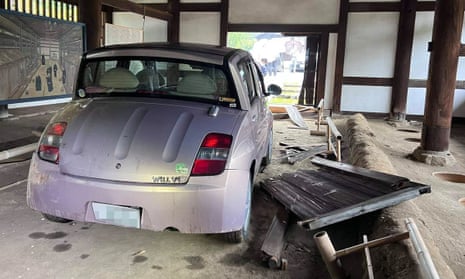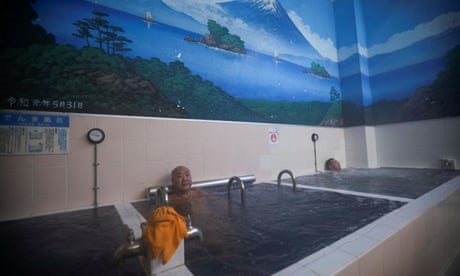Worker mistakenly accelerated while the car was in reverse, crashing into the building’s roughly 500-year old wooden door

The Toyota was reversed into the ancient communal toilet by a man who works for the Kyoto Heritage Preservation Association. Photograph: Kyoto Prefectural Board of Education
Justin McCurry in TokyoTue 18 Oct 2022
Japan’s oldest existing toilet, dating back hundreds of years, has been damaged after it was accidentally rammed by a car driven by an employee of an organisation that preserves cultural relics.
The 30-year-old man, who works for the Kyoto Heritage Preservation Association, damaged the communal toilet, located inside Tofukuji temple in Kyoto, after he mistakenly accelerated while the vehicle was in reverse, crashing into the building’s wooden door, according to media reports.
The man, who has not been named, immediately called police after the incident on Monday morning. No one else was inside the Zen Buddhist temple at the time of the accident, and the driver was unhurt.

The sento owners making group bathing in Japan cool again
The “tosu” restroom, an important cultural property, was built during the Muromachi period about 500 years ago for use by trainee monks, according to the public broadcaster NHK.
Its 2-metre-tall double door and interior pillars were damaged in the incident, the Sora News 24 website reported.
A photo in the Sankei Shimbun newspaper showed the car – a 20-year-old Toyota WiLL Vi – inside the building surrounded by what was left of the wooden doors.
The temple, which could accommodate up to 100 monks at a time, contains a row of about 20 toilets, according to the Asahi Shimbun. The newspaper said the conveniences were still in use as recently as the start of the Meiji era (1868-1912).
Fortunately for the hapless driver, who had been visiting the ancient capital on business, experts say the damage can be repaired.
Toshio Ishikawa, director of the temple’s research institute, said he was “stunned” by the extent of the damage, but relieved that no one had been injured. “We’d like to restore it before the autumn foliage season, but it will probably take until the new year [to repair it],” he told the Kyoto Shimbun.
While the building is usually closed to visitors, the rows of toilets can be viewed through gaps in the building’s exterior.
The toilets – little more than circular holes cut into blocks of stone – are a far cry from the modern-day Japanese toilets that continue to fascinate foreign visitors.
While they did not feature bidet or drying functions, the temple’s toilets were at least located in a convenient place for monks who spent many hours trying to achieve Zen enlightenment – right next to the meditation hall.
Justin McCurry in TokyoTue 18 Oct 2022
Japan’s oldest existing toilet, dating back hundreds of years, has been damaged after it was accidentally rammed by a car driven by an employee of an organisation that preserves cultural relics.
The 30-year-old man, who works for the Kyoto Heritage Preservation Association, damaged the communal toilet, located inside Tofukuji temple in Kyoto, after he mistakenly accelerated while the vehicle was in reverse, crashing into the building’s wooden door, according to media reports.
The man, who has not been named, immediately called police after the incident on Monday morning. No one else was inside the Zen Buddhist temple at the time of the accident, and the driver was unhurt.

The sento owners making group bathing in Japan cool again
The “tosu” restroom, an important cultural property, was built during the Muromachi period about 500 years ago for use by trainee monks, according to the public broadcaster NHK.
Its 2-metre-tall double door and interior pillars were damaged in the incident, the Sora News 24 website reported.
A photo in the Sankei Shimbun newspaper showed the car – a 20-year-old Toyota WiLL Vi – inside the building surrounded by what was left of the wooden doors.
The temple, which could accommodate up to 100 monks at a time, contains a row of about 20 toilets, according to the Asahi Shimbun. The newspaper said the conveniences were still in use as recently as the start of the Meiji era (1868-1912).
Fortunately for the hapless driver, who had been visiting the ancient capital on business, experts say the damage can be repaired.
Toshio Ishikawa, director of the temple’s research institute, said he was “stunned” by the extent of the damage, but relieved that no one had been injured. “We’d like to restore it before the autumn foliage season, but it will probably take until the new year [to repair it],” he told the Kyoto Shimbun.
While the building is usually closed to visitors, the rows of toilets can be viewed through gaps in the building’s exterior.
The toilets – little more than circular holes cut into blocks of stone – are a far cry from the modern-day Japanese toilets that continue to fascinate foreign visitors.
While they did not feature bidet or drying functions, the temple’s toilets were at least located in a convenient place for monks who spent many hours trying to achieve Zen enlightenment – right next to the meditation hall.
No comments:
Post a Comment